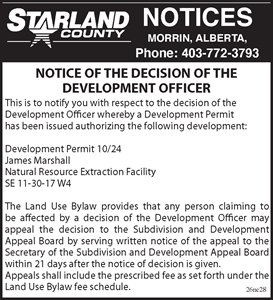The Drumheller Regional Landfill is on target for completion of phase one upgrades to the landfill.
The upgrades will allow the landfill to meet new Alberta regulations, and will give the landfill extended life of operation. The estimated deadline for phase one completion is the middle of September.
“As of today we are on schedule, however with all the rainfall lately, I am not sure how long that will last,” said Waste Management Coordinator for the Drumheller & District Regional Landfill, Tammi Nygaard.
Phase one will allow garbage to be placed on a liner
that is made up of non permeable soil, keeping possibly contaminated
fluid from being absorbed into the ground. The fluid will then be sent
through the new leachate collection system that will transport the
fluid to the sewage treatment plant.
The new leachate collectionsystem will be placed in eight new dumping areas or cells after phase one completion.
“This will give us at least 15 more years of life,” said Nygaard.
Also included in phase one is a new
retention/detention pond, run on, run off control system, and many
reinstalled ground water monitoring wells.
“The purpose for these is to keep leachate out of our
ground water,” said Nygaard. “Leachate comes from decomposed garbage.
It is highly toxic, and is not very nice for fish or aquatic
environment.”
Phase two will include the expansion of the regional
recycling program and a new composting facility. Recycling depots will
be constructed and placed within the service region, allowing the
public and commercial enterprises an opportunity to recycle their
household and light commercial wastes.
The ability to recycle more materials will conserve space in the landfill.
The final step is phase three, and will include more cells for dumping. Phase three will likely not be built for many years.
“If our new composting and recycling programs work well, then we may not need phase three for a long time,” said Nygaard.
The money for this project was awarded back in 2007,
with money being given three ways between federal, provincial and
municipal funds. The Canada-Alberta Municipal Rural Infrastructure Fund
(CAMRIF) awarded the Landfill $5.2 million for the project. The total
cost of the project was $7.8 million.



























